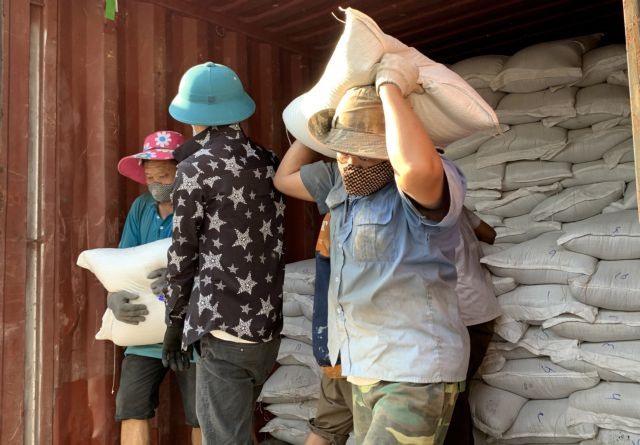.jfif) Opinion
Opinion

Trần Quốc Toản, Deputy Director-General of the Import-Export Department, under the Ministry of Industry of Trade, gave an interview to Pháp Luật (Legal Affairs) newspaper in Hồ Chí Minh City on Việt Nam’s decision to gradually eliminate all temporary import and reexport activities through Việt Nam-China sub-border gates.

|
Workers wear masks as they unload goods from containers at Ma Lù Thàng border gate in the northern mountainous province of Sơn La. VNA/VNS Photo Việt Hoàng
Trần Quốc Toản, Deputy Director-General of the Import-Export Department, under the Ministry of Industry of Trade, talks to Pháp Luật Thành phố Hồ Chí Minh (HCM City Legal Affairs) newspaper on Việt Nam’s decision to gradually eliminate all temporary import and re-export activities through Việt Nam-China sub-border gates.
Will you please explain Việt Nam’s decision to eliminate all temporary import and re-export activities through unofficial sub-border gates along the Việt Nam-China border?
All temporary import-export activities across the border including consignment of goods from overseas into bonded warehouses are considered internationally as normal business activities. However, in Việt Nam, these activities cause quite a lot of risks as Vietnamese law has allowed temporary import-export activities to take place in all sub-border gates and even in unofficial cross border gates with neighbouring countries.
Such unofficial cross border import-export activities can cause many risks, including to diplomatic relations between Việt Nam and its neighbouring countries. Furthermore, it has negatively impacted on relations between Việt Nam and its neighbours and the volume of goods going through official border gates.
Do you mean that in the near future such unofficial cross border activities will be banned?
Recently, all countries sharing borders with Việt Nam have tightened border controls. Such activities have hampered Vietnamese unofficial cross border activities. They have caused big losses to Vietnamese enterprises due to the tax incurred in goods storage and many other expenses and they still cannot export their goods to China.
At the request of the People’s Committee from the northern border province of Quảng Ninh, the Ministry of Trade organised a meeting with participants coming from concerned ministries and sectors, and together, the participants drafted a document on the cessation of temporarily imported-exported activities through Vietnamese unofficial border gates or international border gates.
With the Prime Minister’s approval, the Ministry of Industry and Trade then quickly developed Circular No.09/2020 and posted it on its website.
What will be the negative impacts of Circular No.09/2020 when it comes into force?
For the immediate future, the circular may have negative impacts on enterprises which are doing businesses in temporary import-export activities. However, I don’t think the negative impacts will be too big as recently quite a few neighbouring countries have already tightened cross border trade through their sub-border gates, including unofficial border gates. In the long run, all temporary import-export activities will only be done through international border gates. This policy will create a legal corridor for enterprises to pursue stable, sustainable and efficient business. Adding to that it will also help Vietnamese enterprises cut risks when their goods have to go through sub-border gates, including unofficial cross border gates with neighbouring countries.
To help reduce losses for Vietnamese enterprises, the Ministry of Industry and Trade has developed a roadmap which will come into force from January 1, 2021, so that all the enterprises will have time to prepare and develop business plans to make them in line with requirements on temporary import-export activities to go through these border gates.
Has the MOIT developed a plan on the halt of border trade activities?
Basically speaking, Chinese policies on tightening the imports of farm products and fisheries are in line with the international norms and practices. That’s why most of the countries in the region and elsewhere have worked closely with China or they have developed their own regulations or instructions to help enterprises to comply with what is regulated by China.
For Việt Nam, the Ministry of Industry and Trade has many times given warnings, recommendations and instructions to export enterprises and localities to closely follow China’s rules on cross-border trade policies. The MOIT has also recommended Vietnamese enterprises switch to official trade instead of cross border trade. — VNS




